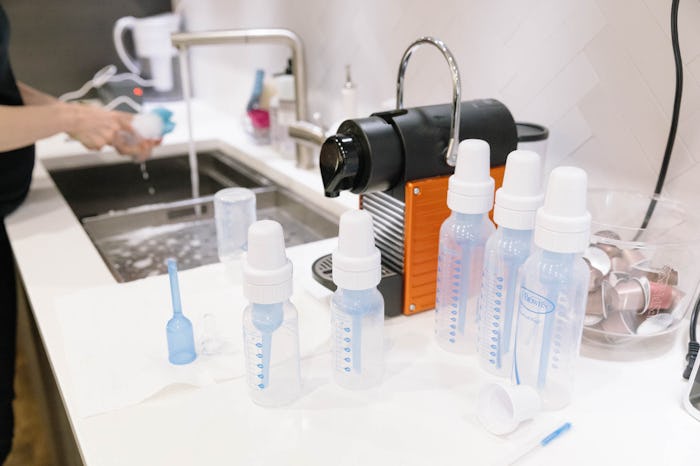Life
Here's How Many Bottles You'll Want On Hand For Your Baby
From the moment you discover you are pregnant, there is a secret door that opens to a not-yet-discovered world of baby gear. Who knew that there were 222 diaper options and a gajillion different burp cloths, blankets, onesies, bouncers, and breastfeeding pads from which to choose? It can honestly all feel a bit overwhelming. Which is why it's no surprise that many soon-to-be moms are curious about how many bottles you need to have for a baby. After all, the options are aplenty.
According to Baby Center, the number of bottles you'll need "can range from about four to 12, depending on whether you'll primarily be bottle-feeding or breastfeeding." The website recommends starting with 4-ounce bottles and moving on to 8- or 9-ounce bottles when your little one reaches about 4 months, or "whenever your baby's growing appetite makes bigger bottles more practical."
If you are formula feeding, then the number of bottles you need will vary depending on two major factors, according to Trimester Talk. First, you'll have to consider how often you plan to wash and sterilize your bottles. Secondly, the number of bottles you have on hand might also be affected by whether or not you plan to prepare bottles in advance or just make each one prior to feeding your baby, the website noted.
Even if you are breastfeeding, you will likely want to have a few bottles on hand in the event you head out sans baby, or head back to work and rely on a caregiver to feed them. Just be careful about how and when you introduce the bottle, Parents magazine noted. "It's important that baby gets the hang of breastfeeding before you offer him a bottle, and this process often takes four to six weeks," Gina Ciagne, a certified lactation counselor and senior director for professional relations at Lansinoh Laboratories, told the magazine. When infants are given bottles earlier on, they can sometimes develop a preference for the bottle, which may lead to an unwillingness to breastfeed.
When it does come to choosing a bottle, there are certainly a number of options on the market, perhaps making it difficult to choose the right one for your baby. According to BabyGearLab, there are four main types of bottles: plastic, glass, stainless steel, and silicone. Each option, of course, comes with its own set of pros and cons. For instance, plastic bottles are lightweight and budget-friendly, but they come with concerns related to chemicals in the plastic. On the other hand, glass bottles are typically heavier than plastic alternatives and break more easily, but they are also "often easier to clean, harder to scratch, have a longer lifespan, and are eco-healthy," the website noted.
Once you choose a bottle that works for you and your little one, you'll want to select a nipple style. The main difference between nipple styles is the shape. Some are narrow, while others mimic an actual breast, according to BabyGearLab.
Honestly, what it all comes down to is your baby's preference, as well as discovering a functionality that works for you. After all, you'll be the one assembling the darn thing during those middle-of-the-night wake-up calls or as you attempt to dash out the door to make it somewhere (kind of) on time.
Like all things in this parenting life, do what works for you. The options for bottles and other baby gear are seemingly endless, but the exact right thing for one person might be the exact wrong thing for you. Do yourself a favor and choose a bottle that makes this gig as easy as possible for you and your baby — you'll be glad you did.
